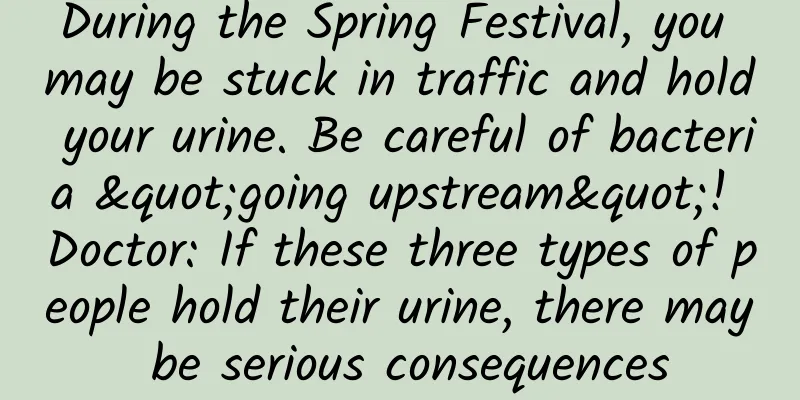What is the method of nursing for dysmenorrhea pain

|
How to scientifically relieve women's dysmenorrhea? Among many gynecological diseases, dysmenorrhea is relatively common, and the high incidence threatens the lives and work of many women. Whenever menstruation comes, patients are in unbearable pain. Today we will learn about the scientific care methods for patients with dysmenorrhea. Experts say: "Most women skip meals and eat too much sweets and salty food." Although a healthy diet cannot eliminate menstrual cramps, it has a magical effect on improving overall health. Avoid junk food that is too sweet or too salty, which will make you bloated and slow down. Eat more vegetables, fruits, chicken, fish, and try to eat small meals frequently. Taking vitamins The expert pointed out that many of his patients have less menstrual pain after taking the right amount of vitamins and minerals every day. He recommends taking a multivitamin and mineral, preferably one that contains calcium and a low dose, which you can take several times a day (after meals). Mineral supplementation Calcium, potassium and magnesium minerals can also help relieve menstrual cramps. Experts have found that women who take calcium have less menstrual cramps than those who do not. Magnesium is also important because it helps the body absorb calcium efficiently. You may want to increase your calcium and magnesium intake before and during your period. Avoid caffeine The caffeine in coffee, tea, cola, and chocolate can make you nervous and may cause discomfort during menstruation. Therefore, caffeine should be avoided. In addition, the oils in coffee may also irritate the small intestine. Prohibition of alcohol If you are prone to swelling during your period, alcohol can make the problem worse. Avoid alcohol. If you must drink, limit it to one or two drinks. Do not use diuretics Many women believe that diuretics can reduce menstrual swelling and discomfort, but Dr. Lack advises against this approach. Diuretics excrete important minerals and water from the body. Dr. Lack recommends reducing the intake of substances such as salt and alcohol that cause the body to retain water. Stay warm Keeping your body warm will increase blood circulation and relax your muscles, especially in the pelvic area where spasms and congestion may occur. Drink plenty of hot herbal teas or hot lemon juice. You can also place a heating pad or hot water bottle on your abdomen for a few minutes at a time. Mineral bath Add 1 cup of sea salt and 1 cup of sodium bicarbonate to a tub of warm water. Soak for 20 minutes to help relax muscles and relieve menstrual cramps. sports Walking or engaging in other moderate exercise, especially before your period, will make you more comfortable during your period. Practice yoga Yoga can also help relieve pain. Here's an example: Kneel down with your knees bent and sit on your heels. Place your forehead on the ground and stretch your arms out to your sides. Hold this position until you feel uncomfortable. Taking pain medication Aspirin and acetaminophen can relieve menstrual cramps. However, more effective over-the-counter medications include Advil, Haltran, Medipren, and Nuprin. These medications contain ibuprofen, which inhibits the action of prostaglandins. When menstrual cramps begin, take one tablet with a little milk or food to avoid upset your stomach, and continue taking until the cramps go away. Acupressure The feet contain a number of acupressure points that are believed to be connected to the pelvic region's qi pathways. There are acupressure points in the depressions on both sides of the ankles. Gently pinch with the thumb and other fingertips, then move up along the Achilles tendon to the calf muscle. After the right foot is finished, switch to the left foot and continue acupressure for a few minutes on each foot. The above content is the editor's introduction on how to scientifically care for patients with dysmenorrhea. When dysmenorrhea occurs, don't be careless. Think that it will be fine after a while and the patient will not have to endure the torture. You must know that dysmenorrhea is a gynecological disease with a strong recurrence rate, so everyone must pay more attention. |
<<: Treatment of chronic pelvic inflammatory disease
>>: Causes of ovarian cysts in women
Recommend
Why do women get cervical erosion? Revealing the real cause of cervical erosion
Erosion, these two words are scary, they easily r...
Is it normal to have a miscarriage of the first child? Expectant mothers don’t need to be too sad or force a miscarriage
Many women experience miscarriage after becoming ...
Multiple diagnostic methods for cervical precancerous lesions
Many women do not pay attention to their own hygi...
Who is more likely to get endometrial tuberculosis?
Who is more likely to get endometrial tuberculosi...
What to do about early threatened miscarriage
What should we do if we have threatened abortion ...
Beef labeling inspection shows the most problems to be corrected in food and beverage establishments
The Department of Health has fully mobilized all ...
Causes and prevention of acute adnexitis
In medicine, acute adnexitis is the inflammation ...
Let’s take a look at what are the causes of pelvic inflammatory disease?
Pelvic inflammatory disease is a common gynecolog...
Can fungal vaginitis cause vaginal bleeding?
Can fungal vaginitis cause vaginal bleeding? Cand...
Can I get pregnant normally with primary amenorrhea?
Primary amenorrhea may affect pregnancy, but preg...
What fruits can I eat after hydatidiform mole curettage
After the evacuation of hydatidiform mole, it is ...
What effects will irregular menstruation have on female friends?
What effects will irregular menstruation have on ...
A careful interpretation of the dietary care measures for vaginitis
Vaginitis is also a common disease. In the treatm...
What causes biochemical miscarriage?
Biochemical pregnancy abortion refers to the abor...
What causes vaginitis?
Vaginitis may be caused by bacterial infection, f...









